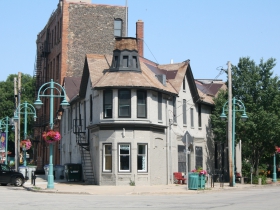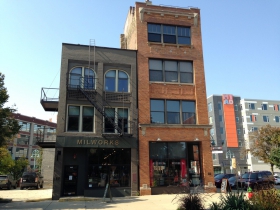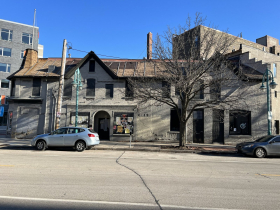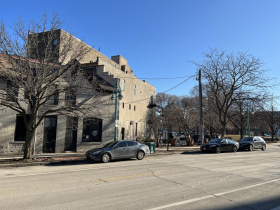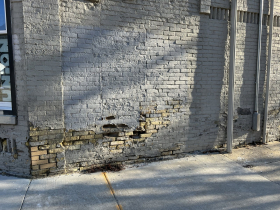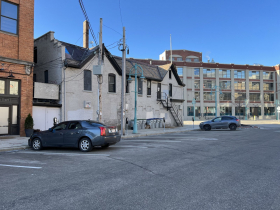Third Ward Tavern Saved… For Now
Developer says it won't appeal denial of its demolition request by Historic Preservation Commission.
Preservation advocates appear to have won what might ultimately only be the first battle in an already-years-long war to save a Historic Third Ward tavern.
A representative of the development team that argued the fire-damaged, vacant tavern at 266-272 E. Erie St. was beyond practical repair and sought to demolish the structure emailed city officials Monday to say that the firm doesn’t intend to appeal the Historic Preservation Commission‘s Sept. 11 decision. But no plans to rehabilitate the building were referenced.
The commission, which cannot legally consider economic factors under the city’s preservation ordinance, voted to deny the development team’s request to demolish the building. Such decisions can be appealed to the full Common Council, which is free to weigh economic considerations and any others, in rendering a final decision.
Constructed in 1884, the two-story building was originally a saloon and rooming house operated by the widowed Catherine Foley. Miller Brewing acquired the property in 1896, using it as a tied-house tavern, and expanded the structure in 1912. It later housed a prominent gay leather bar, Wreck Room, and served as the Milwaukee Institute of Art and Design’s (MIAD) student union. A fire struck in January 2013, shuttering the building.
The development team is a partnership of General Capital Group and Joseph Property Development. Both firms have completed projects in the neighborhood and rehabilitated historic structures in the past. But their argument has been that rehabilitating the tavern would effectively yield a new building that is only a facsimile of the tavern building.
“It was well known when we purchased it that it was to be demolished,” said General Capital partner Linda Gorens-Levey last Monday during the commission’s hearing. “It is simply not feasible to restore this building.” She said the partners, who purchased the building and two adjoining properties in 2014 for $760,000, never would have bought it if it was historic. But it was given local historic protection in 2015, which triggers the need for a “certificate of appropriateness” for any demolition or modification.
Preservation advocates and historic commission senior planner Tim Askin said the tavern has played an important role in the city’s Irish and LGBTQ+ history and merits preservation, especially given that is a rare building that survived the 1892 Third Ward fire. Askin said the structure, which hasn’t been substantially repaired since the 2013 fire, appears to be an example of “demolition by neglect.” He said the commission has seen buildings in worse shape that have been successfully rehabilitated.
Architect Chris Socha, a partner at The Kubala Washatko Architects, said the issue isn’t truly the 2013 fire, but the nature of the 1912 addition. “These buildings were basically joined together at that time and that’s a principal reason these buildings have so many issues,” said Socha. Structural engineer Alan Rentmeester of Spire Engineering detailed the differing foundation systems each employs, and how one is now leaning on the other, causing a cascading series of issues including failing brick masonry.
On Monday, Gorens-Levey told Urban Milwaukee she had no comment on the firm’s plans for the building. The firm, legally speaking, has until Oct. 4 to file its appeal and Gorens-Levey’s email to the city pledging not to appeal is nonbinding.
A plan was presented to the Historic Third Ward Architectural Review Board in 2017 to save the building, but it did not progress. Socha, Gorens-Levey and others associated with the project attributed that to the fact that further research revealed more significant issues with the building, more components that need to be wholly replaced and, ultimately, greater costs.
Area Alderman Robert Bauman, a preservation advocate and member of the historic commission, had in 2014 supported the demolition-and-replacement plan. “I reluctantly said, okay, that’s fine,” said Bauman, citing the past quality of the development team’s work, improved financial health for MIAD and the lack of community opposition. But he said once the nomination for historic designation came forward, he changed his mind.
In February, the development team said it was considering a “sympathetic” replacement structure that would be compatible with the neighborhood and similar in scale to the original building.
Photos
Legislation Link - Urban Milwaukee members see direct links to legislation mentioned in this article. Join today
If you think stories like this are important, become a member of Urban Milwaukee and help support real, independent journalism. Plus you get some cool added benefits.
Eyes on Milwaukee
-
Church, Cupid Partner On Affordable Housing
 Dec 4th, 2023 by Jeramey Jannene
Dec 4th, 2023 by Jeramey Jannene
-
Downtown Building Sells For Nearly Twice Its Assessed Value
 Nov 12th, 2023 by Jeramey Jannene
Nov 12th, 2023 by Jeramey Jannene
-
Immigration Office Moving To 310W Building
 Oct 25th, 2023 by Jeramey Jannene
Oct 25th, 2023 by Jeramey Jannene



